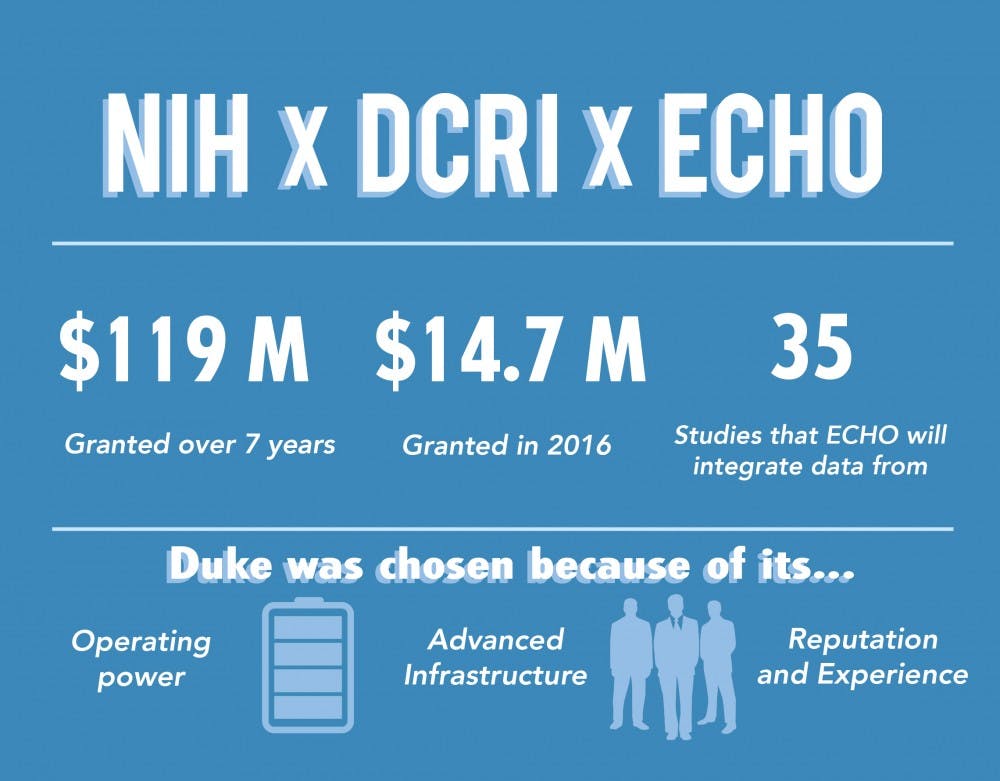The National Institutes of Health has named the Duke Clinical Research Institute the coordinating center of an initiative to study how environmental factors affect children's health.
The DCRI will receive a grant for $14.7 million in the 2016 fiscal year as part of a seven-year grant with a total value of $119 million. This will fund the Environmental Influences on Child Health Outcomes initiative which aims to advance knowledge of how early environments—including physical, social, natural and built environments—influence children's health.
Dr. Kristin Newby, co-principal investigator for Duke and professor of medicine, said that ECHO will integrate data from 35 existing and ongoing longitudinal studies to maximize their scientific value. As the coordinating center, the DCRI will support communications between the different groups of the initiative, create research protocols and finance research for younger researchers, explained Dr. Brian Smith, the principal investigator and professor of pediatrics.
“We don’t know as much as we think,” Smith said. “A lot of health outcomes are not driven by one single thing... So being able to have a large cohort where multiple outcomes can be collected from that cohort is maybe the first time we can look at all these interactions.”
Taylor Nguyen, a senior business development associate at Duke who was part of the grant-writing group, noted that the Duke Clinical Research Institute stood out in the selection process because of its operating power and reputation.
DCRI's experience in pediatrics, along with several other factors, made it an ideal recipient of the grant, Newby noted.
“Many things going on at the DCRI made us very competitive,” she said. “We have a known fantastic infrastructure already in existence through the DCRI, we have the expertise in pediatrics and working with the NIH and we also have the experience running longitudinal cohort studies.”
The ECHO initiative will also include the Opportunities and Infrastructure Fund run by Dr. Daniel Benjamin, DCRI faculty associate director. The fund will give junior investigators the opportunity to conduct research using the ECHO data and also promote competition. Investigators will be able to apply for access to the data.
Benjamin explained that investigators at the start of their career rarely have access to large sets of data or clinical investigations of their own, because these costly procedures are usually given to more experienced investigators. The data from these larger studies are rarely shared as widely as the ECHO data will be, Benjamin noted.
“Investigators often make it hard to get access to their data in passive-aggressive ways,” Benjamin said. “Our research group decided that we were going to give open access to people, so the application process takes just about 15 minutes. NIH dollars are so coveted by investigators and institutions that it’s incumbent on the institution to make the data truly available, rather than now when they’re only available in theory.”
He also said that the inability to access multiple trials prevents investigators from learning how to do future studies more effectively.
Newby noted that the fund will allow a range of investigators to work together.
“From a clinical and scientific standpoint, understanding what influences health both immediately in childhood but also [what influences] chronic diseases in later life is particularly important,” Newby said. “From my perspective, this is just a huge opportunity for science but also for potentially helping improve child health. It’s just a very innovative way to bring a community of thinkers together to accelerate the process.”
Get The Chronicle straight to your inbox
Signup for our weekly newsletter. Cancel at any time.

